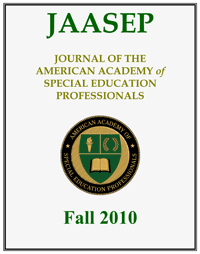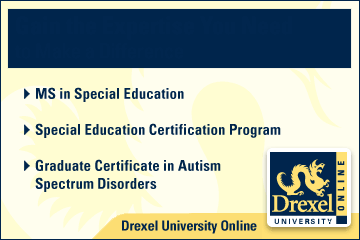| Dear NASET Members Welcome to NASET's WEEK in REVIEW. Here, we provide you with the latest publications from NASET to read and download, as well as some of the most interesting issues that have happened this week in the field of special education. We hope you enjoy this publication. Feel free to send us articles for this publication or let us know your thoughts about the WEEK in REVIEW at news@naset.org. Have a great weekend.
Sincerely,
NASETNews Team |
| New This Week on NASETNASET Resource Review
OCTOBER 2010 In This Issue You Will Find Resources in the Following Areas: To read or download this issue - Click here
Autism Developmental Disabilities Early Intervention Health Issues With Children Intellectual Disabilities Inservice Training Instructional Materials Mathematics Reading Techniques School Drop Out and Disabilities Special Education Resources Strategies for Teaching Teacher Effectiveness Teacher Resources
____________________________________________________
Lesser KnownDisorders Disorders In this Issue: _____________________________________________
FALL 2010 JAASEP Articles Available In This Issue:
Identifying and Working with Elementary Asperger's Students in Rural America Rise to the Challenge: Examining the Relationship of Swimming & Autism Spectrum Disorders Preservice General Education Teachers' Attitudes and Knowledge of Special Education Multiple-Choice Tests with Correction Allowed in Autism: An Excel Applet The Use of Assistive Technology for People with Special Needs in the UAE Punishment Strategies: First Choice or Last Resort Picture Exchange Communication System for Individuals with Autism Spectrum Disorder Locus of Control, Interest in Schooling and Science Achievement of Some Deaf and Typical Secondary School Students in Nigeria Educational Solutions for Children with Cerebral Palsy Teachers' Perceptions on Special Education Preparation: A Descriptive Study Comparison of Metacognitive Strategies Used by Individuals with ADHD in Online Instruction
To read or download this issue - Click here (login required) |
| NASET Sponsor - DREXEL ONLINE To learn more |
|  NASET Sponsor - HEINLE, part of Cengage Learning |
| Poll: Americans Misunderstand Learning Disabilities A majority of Americans think that neurologically based learning disabilities are the result of laziness and cling to other serious misperceptions about the disorders, a new national poll found. Confusion about the definition and causes feeds into a stigma that has long surrounded learning disabilities, and leads to delays in diagnosis and early intervention that can change the course of a child's life, the report said. Some 2.6 million students -- one in eight in the United States -- have been diagnosed with learning disabilities and receive special education in their schools. Many more are undiagnosed. Learning disabilities are a group of neurological disorders that affect the brain's ability to receive, process, store, and respond to information, and thus can make it difficult to learn certain academic and social skills. Intelligence is not relevant to the definition, and they are not caused by economic disadvantage, environmental factors, or cultural differences. The poll was conducted by GfK Roper and commissioned by the non-profit Emily Hall Tremaine Foundation of New Haven, Conn., which makes grants in the areas of art, environment and learning disabilities. The poll has a margin of error of three points, and the same was made to represent the U.S. adult population. To read more, click here |
| Low Apgar Score at Birth Linked to Cerebral PalsyA low Apgar score at birth is strongly associated with cerebral palsy in childhood, concludes a study from researchers in Norway published on the British Medical Journal website. The Apgar score is a quick and simple way to assess a baby's condition at birth. The baby is assessed on five simple criteria (complexion, pulse rate, reaction when stimulated, muscle tone, and breathing) on a scale from zero to two. The five values are then summed up to obtain a score from zero to 10. Scores of 3 and below are generally regarded as critically low, 4 to 6 fairly low, and 7 to 10 generally normal. Cerebral palsy is a rare disease, affecting two to three infants in every 1000 live born children in Western countries. Recent studies have found a strong link between low Apgar score and cerebral palsy in children born to term or with normal birth weight, whereas studies in children with a low birth weight or born preterm have shown conflicting results. To read more, click here |
| NYC Takes Aim at Teachers' 'Tenure for Breathing'Do public school teachers get tenure just by breathing? It's a claim made by a charter school leader in the education documentary Waiting for Superman, which places much of the blame for bad schools nationwide on union rules that protect incompetent teachers. Mayor Michael Bloomberg announced on national television last week that he would overhaul the way city teachers are granted tenure, linking their advancement to improving student test scores. "Just as we are raising the bar for our students through higher standards, we must also raise the bar for our teachers and principals - and we are," Bloomberg said. But city teachers say that if bad teachers have won tenure protection it's the fault of the administrators who gave it to them. "We don't make that decision. Whoever the principal is makes that decision," said LezAnne Edmond, a Manhattan high school teacher with 15 years of experience. To read more, click here |
| Did You Know That......Under the Individuals with Disabilities Education Act the definition of eligibility for special education and related services has three core parameters: age, specified disability, and the need for services. |
| The Three R's Are Important After AllWrite it, learn it. Recent studies suggest that - surprise! - handwriting is important. Beyond the obvious advantages (your pharmacist can read your doctor's prescription, say), research has revealed that the art of writing is an important learning tool. Gwendolyn Bounds notes in the October 5 Wall Street Journal that children benefit from handwriting, which engages their brains in learning. It improves their expression and idea composition, she says, and helps them develop fine motor skills and learn letters and shapes. Dr. Virginia Berninger, University of Washington professor of educational psychology, observed in her study that when elementary-aged children wrote essays by hand, they expressed more ideas, wrote more words, and wrote them more quickly. Brain scans have shown that the region of the brain responsible for information storage and management (thinking, language, and working memory) is activated by sequential finger movements. In her article "The 'Write Stuff' for Preventing and Treating Disabilities," Dr. Berninger identifies handwriting problems as disabilities. "Written language disabilities are extremely prevalent in the population of children with learning disabilities," she claims. "Writing disabilities are more persistent than reading disabilities." To read more, click here |
| Study: Disparity Found in ADHD Prescriptions for Michigan ChildrenA child in Ironwood is three times more likely to receive a prescription to treat Attention Deficit Hyperactivity Disorder than a child in Alpena, a recently released study shows. The two cities show the highest and lowest concentrations in the state of children prescribed ADHD medication, such as Ritalin or Adderall, according to a study conducted by the Center for Healthcare Research & Transformation. Ironwood, Albion and Grosse Pointe topped the charts while Alpena, Hancock and Detroit were the cities with the least amount of prescriptions. "ADHD and how to treat it is one of those conditions that we don't have good evidence on what the right approach is. It's something that involves many decision makers in the process," said Marianne Udow-Phillips, director of the Ann Arbor-based center that conducted the study. The ADHD results were a portion of the larger study that examined variations in medical care across Michigan. To read more, click here |
| Brain Balance Program Helps Children with AD/HD & Other DisordersDr. Mark Goldenberg, director of the Brain Balance Achievement Center of Norwalk, is a Board-certified Chiropractic Neurologist and Fellow of the American College of Functional Neurology who specializes in working with children affected by ADHD, OCD, Dyslexia, Tourette 's syndrome, processing problems and Autistic Spectrum Disorders. The Center helps children improve socially and academically using a drug-free approach. The founder of the program, Dr. Robert Melillo, author of "Disconnected Kids" and "Neurobehavioral Disorders of Childhood" has spent the last 15 years researching these disorders. Until recently, AD/HD, Learning Disabilities, Asperger's, Tourrette's, PDD and Autism were considered separate entities. Leading authorities now believe that these disorders are part of a common spectrum of developmental disabilities which involve a lack of coordination between both sides or hemispheres of the brain known as a Functional Disconnection Syndrome. Untreated, Functional Disconnection Syndrome becomes a major source of stress and frustration for the child and for the entire family. The approach at the Brain Balance Achievement Center is to concentrate on the cause, not the symptoms and to address each area of functional deficiency. To read more, click here |
| Michelle Rhee Likely to Have Pick of Top Education Jobs, But Would She Want One?The Republican candidate for governor of Iowa thinks she'd be a great head of the state's department of education. Political chatter in New Jersey has her on Gov. Chris Christie's list of candidates for the top job there. Others see her as secretary of education in a second Obama administration, if there is one. Schools Chancellor Michelle A. Rhee has a job, for the moment at least. But after having campaigned against presumptive mayor-elect Vincent C. Gray (D) and then called his victory "devastating" for the city's public schoolchildren - an assertion she quickly sought to recast - Rhee is widely expected leave her post sometime in the near future. Her iffy status, combined with her depiction as a lonely, union-battling champion of D.C. school reform in the new documentary "Waiting for Superman," has made her the name of choice for big education jobs that have come open - and for some that have not. Even those who aren't necessarily looking for a chancellor or a state commissioner seem to have caught Rhee fever. Rupert Murdoch told an audience at the Media Institute awards banquet this week that she needs to continue working to overhaul the country's education system. To read more, click here |
| Minnesota Supreme Court Affirms Access to After School Activities for Special Education Students The Minnesota Supreme Court today upheld a Minnesota Department of Education decision that special education services must be provided to students for extracurricular and non-academic activities, regardless of whether the activity was required for the education of the student. The decision stemmed from a complaint filed by the parents of a fifth grader in the Centennial School District who requested the special education team determine the needed supplementary services to play volleyball and participate in after-school clubs. "All children deserve the opportunity to get the most out of their educational experience, and that includes after-school activities," said Education Commissioner Alice Seagren. "We are pleased the court rejected the narrow reading of federal law put forth by the school district in this case." The decision centered on whether or not extracurricular activities should be part of the formal Individual Education Program (IEP) created for every student in special education. The school district argued it did not have to use the special education IEP team to determine the appropriate accommodations for extracurricular activities not "required for the education" of the student. To read more, click here |
| Assistive Technology: Free Admission to Chicago ConferenceThe Assistive Technology Industry Association (ATIA) is inviting parents, teachers, therapists and end-users of assistive technology to join them at the ATIA Chicago 2010 Conference for free admission to the exhibit hall. This is an excellent opportunity to explore the most recent assistive technology (AT) innovations first-hand-from 100 leading industry vendors-to learn how they can help you as a parent, professional, teacher, or user. If you plan to visit the ATIA 2010 Chicago Exhibit Hall with a group of five or more, ATIA can provide assistance for group visits including financial assistance with transportation. Contact ATIA at info@atia.org for more details. To read more, click here |
| NASET Sponsor - MAYER JOHNSON
To learn more - Click here |
| TRIVIA QUESTION OF THE WEEKGuess the answer to this week's trivia question and we'll recognize you in next week's Week in Review. Congratulations to:
Ross Jones, Shilpa Sanghavi, Gretchen van Besouw, Margaret Leathers, Patrick Crandon, Christie Miller, Yvonne Allan, Ida K. O'Leary, Cindy O'Connor, Maura Lindsay, Mary Goodwin, Lisa Rotella, Lorrie Weaver, Leslie McDermott, Jessica Ulmer, Teri Lodesky, and Jennifer Walker
who correctly identified the answer to last week's trivia question: Many students with disabilities have difficulties learning many things at one time. Teachers often need to break down complex or multistep skills into smaller, easier-to-learn assignments. What is the term that means "breaking down complex or multistep skills into smaller, easier-to-learn assignments"? ANWERS: Task Analysis (Micro-uniting) or Chunking or Scaffolding THIS WEEK'S TRIVIA QUESTION: According to the latest data on special education prevalence in the United States, under IDEA, Specific Learning Disabilities is the most prevalent disability (39.0 percent) followed by Speech and Language Impairments (22.0 percent). What is the 3rd most prevalent disability (at 9.7 percent)? If you know the answer, send an email to contactus@naset.org
All answers must be submitted no later than Monday, October 18, 2010 at 12:00 p.m. |
| Young, Gifted and Likely to Suffer For ItJust the term "gifted child" is enough to raise eyebrows in disdain. Being gifted - having special talents above the average - has never been endearing. No matter how it's presented, it smacks of showing off, of thinking that you're better than anyone else. As with many other labels, it can be a burden. "In this country," says Professor Joan Freeman, "the stereotype is usually of a little boy wearing glasses, can't make friends, verging on Asperger's, may play a violin, small, thin, friendless." Freeman used to subscribe to quite a lot of these myths. "But as the years went by, I began to realise that gifted children are normal human beings." Freeman, a psychologist, knows more about this subject than most, having published a book about gifted children and how they grow up. In Gifted Lives, she chronicles the lives of 20 adults she has followed for 35 years since they were children, variously aged five to 14 when she started. Such a long study has never been done before. To read more, click here |
| Siblings of Children with Autism Share Common SymptomsAutism seems to play a genetically inspired hide-and-seek game in some families. Undiagnosed siblings in families that include two or more children with autism often grapple with language delays, social difficulties and other mild symptoms of the disorder, a new study suggests. Genes prompt autism symptoms of varying intensity among members of these families, including in some kids who don't qualify as having an autism spectrum disorder, say psychiatrist John Constantino of Washington University School of Medicine in St. Louis and his colleagues. Researchers have generally limited their search for DNA peculiarities to children diagnosed with autism or related disorders (SN: 7/3/10, p.12), a strategy that overlooks those with mild autism signs, Constantino's group asserts in a paper published online October 1 in the American Journal of Psychiatry. "Subtle aspects of the autistic syndrome have not been accounted for in most studies of its intergenerational transmission," Constantino says. To read more, click here |
| President Obama Signs Bill Expanding Tech Access for Individuals with DisabilitiesPresident Obama signed legislation Friday designed to expand access to television, the internet and various other telecommunications technologies for Americans with disabilities. The 21st Century Communications and Video Accessibility Act is designed, among other things, to update closed captioning and video description services. It is also meant to improve the dissemination of emergency information to people with disabilities in the event of a crisis. The law is about "equal access, equal opportunity and equal respect for every American," Obama said at the White House. "Each of us has a role to play in our economy" and can "contribute to the American story." To read more, click here |
| Finding Support For Children With DisabilitiesParents of children with severe disabilities have many challenges and concerns. One big worry is who will care for their children after the parents are gone. Al Etmanski is a veteran community activist, and after his daughter Liz was born with Down syndrome, he turned his attention to the needs of those with disabilities and their families. Etmanski was feeling pretty good about the work he was doing in Vancouver, British Columbia, until he was approached by three men at a party. All were in their 70s and had children with disabilities. Etmanski says the men told him they were pleased with his work helping younger parents. But they asked: "What about us?" Etmanski wasn't sure precisely what they meant. The men told him their adult children were OK now, but they were worried about what would happen to their children in the future. Existing programs and services wouldn't keep their children safe, they said. Etmanski says the older parents told him: "We want people to be our eyes and ears and arms and legs when we are not around. We do all kinds of things that paid staff don't do. And who is going to look after our kids when we are gone?" To read more, click here |
| NASET Member Benefit - Group Savings Plus from Liberty Mutual
As a member of NASET you qualify for a special group discount* on your auto, home, and renter's insurance through Group Savings Plus® from Liberty Mutual. This unique program allows you to purchase high-quality auto, home and renters insurance at low group rates.
See for yourself how much money you could save with Liberty Mutual compared to your current insurance provider. For a free, no-obligation quote, call 800-524-9400 or visit www.libertymutual.com/naset, or visit your local sales office.
*Group discounts, other discounts, and credits are available where state laws and regulations allow, and may vary by state. Certain discounts apply to specific coverage only. To the extent permitted by law, applicants are individually underwritten; not all applicants may qualify. Coverage provided and underwritten by Liberty Mutual Insurance Company and its affiliates, 175 Berkeley Street, Boston, MA.
|
| President Obama Signs Bill Replacing 'Mental Retardation' with 'Intellectual Disability'President Barack Obama signed legislation Tuesday requiring the federal government to replace the term "mental retardation" with "intellectual disability" in many areas of government. The measure known as Rosa's Law was approved unanimously by Congress before receiving the go-ahead from the president with little fanfare this week. Under the law, "mental retardation" and "mentally retarded" will be stripped from federal health, education and labor policy. "Intellectual disability" and "individual with an intellectual disability" will be inserted in their place. The rights of individuals with disabilities will remain the same. "This is a really important step, particularly for the self-advocacy community," said Peter Berns, CEO of The Arc, which lobbied heavily for Rosa's Law. "Self-advocates have been working for many years to remove hurtful language and this takes our community one step closer." To read more, click here |
| Did You Know That......Students who are not found eligible for special education under IDEA may nevertheless fall within the purview of Section 504 of the Rehabilitation Act. |
| Children with Down Syndrome: Families Are More Likely to Receive Resources at Time of Diagnosis Than in Early ChildhoodOn October 8, 2008, the Prenatally and Postnatally Diagnosed Conditions Awareness Act was signed into law, requiring the U.S.Government Accountability Office (GAO) to submit a report concerning the effectiveness of current health care and family support programs for the families of children with disabilities. In this report, GAO focused on Down syndrome because it is a medical condition that is associated with disabilities and occurs frequently enough to yield a sufficient population size for an analysis. GAO examined (1) what is known about the extent to which children with Down syndrome receive medical care during early childhood and (2) what resources families of children with Down syndrome receive through their health care providers and what barriers families face to using these resources. GAO analyzed fee-for-service claims data from a very large private health insurance company, for the claims representing its experience with one of the largest national employers, and Medicaid claims data from seven states with high Medicaid enrollment and low percentages of enrollees in Medicaid managed care. GAO also interviewed specialists at six prominent Down syndrome clinics and 12 advocacy groups to examine what resources families receive and to identify barriers they face. GAO also analyzed data from the Health Resources and Services Administration-sponsored 2005-2006 National Survey of Children with Special Health Care Needs on barriers to accessing needed services. To read more, click here |
| Did You Know That.....Eligibility for special education and related services always depends on evidence of an adverse educational impact as a result of the child's disability. |
| Neuroscience Research May Help Individuals Recover from Brain InjuryBy examining how we learn and store memories, scientists from UCLA and Australia have shown that the way the brain first captures and encodes a situation or event is quite different from how it processes subsequent similar events. The study is published journal PLoS ONE. Memories are formed in the part of the brain known as the hippocampus, a seahorse-shaped structure that plays critical roles in processing, storing and recalling information. The hippocampus is very susceptible to damage through stroke or lack of oxygen and is critically involved in Alzheimer's disease, said study co-author Michael Fanselow, a UCLA professor of psychology and a member of the UCLA Brain Research Institute. When a memory is first formed, a small protein involved in synaptic transmission -- the NMDA receptor -- is indispensable to the process, said study co-author Bryce Vissel, a group leader of the neuroscience research program at Sydney's Garvan Institute of Medical Research. Activation of the NMDA receptor allows calcium to enter a neuron, and calcium permeability enables a chain of molecular reactions that help encode experience and consolidate memory, Fanselow and Vissel said. To read more, click here |
| Children, Males and Blacks Are at Increased Risk for Food Allergies, Study FindsA new study estimates that 2.5 percent of the United States population, or about 7.6 million Americans, have food allergies. Food allergy rates were found to be higher for children, non-Hispanic blacks, and males, according to the researchers. The odds of male black children having food allergies were 4.4 times higher than others in the general population. The research, which was funded by the National Institutes of Health and appears in the Journal of Allergy and Clinical Immunology, is the first to use a nationally representative sample, as well as specific immunoglobulin E (IgE) or antibody levels to quantify allergic sensitization to common foods, including peanuts, milk, eggs, and shrimp. The hallmark of food allergy is production of IgE antibodies to a specific food protein. Once IgE antibody is made, further exposure to the food triggers an allergic response. IgE levels are often high in people with allergies. To read more, click here |
| Controversy Continues Over ADHD Medication, Sudden Cardiac DeathsDue to a paucity of data, controversy persists regarding the risk of adverse cardiac events associated with children taking medications for attention-deficit/hyperactivity disorder, according to a speaker at the 2010 American Academy of Pediatrics National Conference and Exhibition. Between 1999 and 2004, 19 children prescribed ADHD medications were reported to the FDA voluntary reporting system to have died suddenly, and 26 children were reported to have experienced CV events, including heart palpitations, strokes and cardiac arrests, and this prompted public concern about these medications, according to Jeffrey A. Towbin, MD, executive co-director of the Heart Institute at the Cincinnati Children's Hospital Medical Center in Ohio. According to Towbin, some methylphenidates have been linked with increased heart rates and BPs, but ECGs show little to no change. Similar results were found for other ADHD treatments containing amphetamines. Amphetamine abuse, however, was associated with certain cardiac problems, including myocardial hypertrophy and endocardial thickening. To read more, click here |
| Individuals with Disabilities Still Get Cool Reception in U.S. WorkplaceWhile many American companies say that hiring people with disabilities is important, few of them actually hire these job seekers or take steps to provide a welcoming work environment, a new survey finds. The national poll of 411 senior executives and human resource managers found that 70 percent of respondents' companies have diversity policies or programs in place, but only two-thirds of those with programs include disability as a component. Only 18 percent of companies offer an education program designed to integrate people with disabilities into the workplace, and only 19 percent of companies have a specific person or department that oversees the hiring of people with disabilities, compared with 40 percent in 1995. To read more, click here |
| Food for Thought........Remember happiness doesn't depend upon who you are or what you have; it depends solely upon what you think. Dale Carnegie |
|
 Earn
your M.Ed. in Curriculum & Instruction: Special Education from Concordia
University
Earn
your M.Ed. in Curriculum & Instruction: Special Education from Concordia
University


